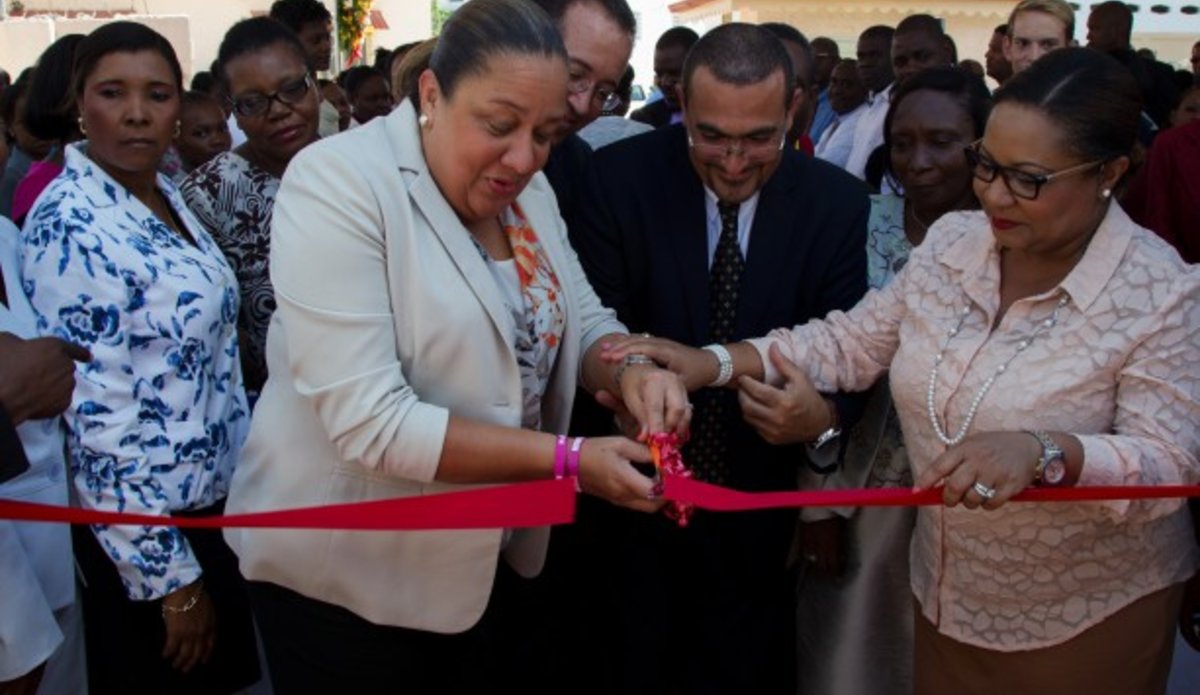An advanced-level institution for training midwives in HaitiUn institut supérieur de formation des sages-femmes en Haïti
The National Institute for Advanced Training of Midwives opened its doors on Monday, October 7th in the Cite Soleil area of Port-au-Prince. The inauguration signals changes in the way midwives are trained in Haiti.
L’Institut national supérieur de formation des sages-femmes a ouvert ses portes ce lundi 7 octobre 2013 à Cité Soleil, quartier populaire de Port-au-Prince. Une inauguration qui apporte des changements dans la formation des sages-femmes en Haïti.
The first change introduces two Sections in the training of midwives. The direct entry Section of three years, is for baccalaureate candidates. The internal Section - open to midwives with diplomas and licensed by the State - lasts 18 months. According to Renauld Grand’Pierre, Director General of the Ministry of Public Health and Population, this change aims - in the short term - to train 600 midwives to meet the need for qualified personnel needed in maternity wards throughout Haiti.
The second change relates to the content of the training. "The design of this program has been the subject of much discussion and thorny debate among experts. It is the world's largest program implemented to support the training of midwives in developing countries," said Ramitz Alakbarov, Representative of the United Nations Population Fund (UNFPA) in Haiti, which provided funding.
The first group of midwives who entered the new building included a mix of 80 students destined for both Sections.
MINUSTAH has provided material and technical support, including the construction of three prefabricated buildings to house four classrooms, a demonstration room, a computer lab connected to the Internet, a dormitory and a staff room.
The inauguration ceremony was attended by Haiti’s First Lady, Sophia Martelly, and the Minister of Health and Population, Florence Duperval Guillaume.
The United Nations was represented by Carl Alexandre, Deputy Special Representative of the Secretary-General in Haiti, and the aforementioned UNFPA Representative in Haiti
Antoine Adoum Goulgué
Le premier changement introduit deux sections dans la formation des sages-femmes. La section de trois ans, en entrée directe, s’adresse à des candidates bachelières. La section interne, ouverte à l’intention des sages-femmes diplômées d’Etat titulaires de la licence, dure 18 mois. Selon Renauld Grand’Pierre, Directeur général du ministère de la santé publique et de la population, ce changement vise, à court terme, à former 600 sages-femmes et va combler les besoins en personnel qualifié constatés dans les maternités haïtiennes.
Le second porte sur le contenu de la formation. « La conception de ce programme a fait l’objet de nombreux échanges et discussions épineuses entre les experts. C’est le plus grand programme mondial mis en œuvre pour soutenir la formation des sages-femmes dans les pays en développement », estime Ramitz Alakbarov, le Représentant du Fonds mondial de la population (FNUAP) en Haïti, qui en assure le financement.
La première promotion de sages-femmes qui a ainsi fait sa rentrée dans les bâtiments neufs comprend 80 étudiantes toutes sections confondues. La MINUSTAH a apporté un appui matériel et technique, notamment par la construction de trois bâtiments préfabriqués hébergeant quatre salles de classe, une salle de démonstration, un laboratoire informatique connecté à Internet, un dortoir et une salle des professeurs.
La cérémonie a vu la participation de la Première Dame d’Haïti, Sophia Martelly et de la ministre de la Santé et de la population, Florence Duperval Guillaume.
Les Nations Unies étaient représentées par Carl Alexandre, Représentant Spécial Adjoint du Secrétaire général en Haïti et par le Représentant de l’UNFPA en Haïti
Antoine Adoum Goulgué
 ONU
ONU Nations Unies Maintien de la paix
Nations Unies Maintien de la paix



